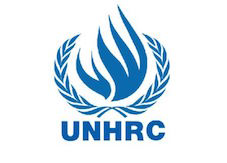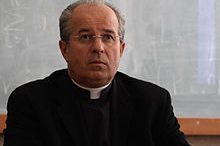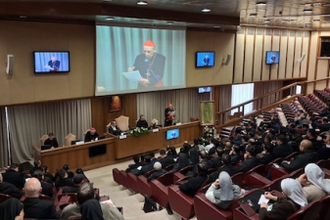CAFOD welcomes UN efforts to stop human rights abuses by transnational corporations

A landmark moment in the UN Human Rights Council took place last week, as countries began negotiating the text of a UN treaty on transnational corporations and other business enterprises with respect to human rights.
CAFOD said in a statement today: This represents important progress for the communities, workers, and survivors who have struggled for decades to protect their human rights from violations and abuses by irresponsible transnational corporations and other business enterprises.
From 15-19th October, over 400 civil society groups gathered at the UN in Geneva to support the Intergovernmental Working Group tasked with developing a binding instrument to ensure that businesses respect human rights. Last year valuable time and energy was wasted by attempts by the EU to hold up the process. This year, CAFOD and a broad coalition of environmental groups, trade unions and church leaders called on governments to get to grips with the real challenges, in the light of the very real dangers that communities, workers, activists and human rights defenders face now if they challenge business interests.
CAFOD lead analyst on the Private Sector Anne Lindsay said: "We are pleased that the EU didn't try to block this crucial process but frankly we expect more. So many global companies are based in Europe. The European Union and individual member states, including the UK, should bring their collective experience to the content of the Treaty. This is particularly important on the key questions such as communities' access to justice if things go wrong and mandatory human rights due diligence to predict and prevent harm in the first place.
"We have already done our own analysis of how the text can be strengthened so that global companies are required to respect human rights and the environment wherever they operate. Now we want the EU to match its words about protection of human rights defenders with a change in its approach before the next session in October 2019.
"The Catholic Church has also played an important role, with the European Bishops Conference and the Latin American Bishops Conference calling for constructive engagement by all governments in the Binding Treaty.
"We welcome the Holy See's continued strong support for the process. In an oral statement during the Treaty Session on Monday, the Holy See affirmed representatives showed their strong support for the process by saying that "A binding instrument would raise moral standards, change the way international corporations understand their role and activity and help clarify the extraterritorial obligations of States regarding the acts of their companies in other countries."
Mgr Ramazzini from Guatemala condemned the severe inequality in access to natural resources that have affected his diocese. He stressed that such resources should be considered a common right available to ensure human dignity for Guatemalans.
CAFOD partner organisations from Colombia raised their concerns about the impacts of megaprojects by transnational companies on local rivers and communities. A representative from Colombia, said: "At an international level, we want to tell company shareholders that you are doing damage by investing your money there. You are receiving resources that costs blood and lives."


















